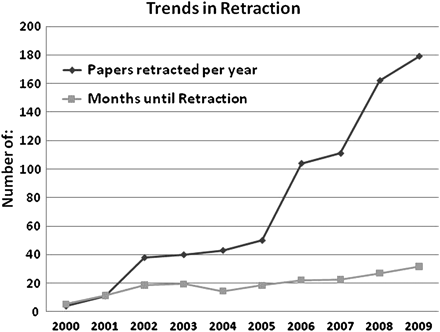742 wetenschapspublicaties: Fraude en plagiaat…
In de periode 2000-2010 zijn er 742 Engelse wetenschappelijke publicaties teruggetrokken, nadat ze gepubliceerd waren. Aldus R Grant Steen in het artikel 'Retractions in the scientific literature: is the incidence of research fraud increasing?' (J Med Ethics 2011;37:249-253 doi:10.1136/jme.2010.040923). De schrijver van dit bijzondere artikel stelt dat fraude de laatste jaren toegenomen is in de wetenschap. Hier zijn bewijs.
De auteur verdeelt wetenschappelijke problemen in twee grote groepen, we citeren:
Fraud is defined as:
Data fabrication: theft of data from an uncredited author (or generation of completely artificial data). Data falsification: editing or manipulation of authentic data to “prove” a hypothesis.
Error is defined as:
Plagiarism: theft of text from an uncredited author. Duplication: self-plagiarism (using substantially the same data or words in different publications without citation). Scientific mistake: a mistake that invalidates research, typically explained carefully in a retraction notice. Ethical issues: violations of accepted publication practice (eg, publishing without co-author approval, patient-related IRB violations, etc). Journal error: accidental duplicative publication by a journal through no fault of the authors. Unstated: retraction notice is non-informative, simply stating that retraction has happened.
Op zich al allemaal onprettige zaken.
Hier de curve van teruggetrokken papers per jaar:

De auteur stelt op basis van deze gegevens dat:
It is particularly striking that the number of papers retracted for fraud increased more than sevenfold in the 6 years between 2004 and 2009.
During the same period, the number of papers retracted for a scientific mistake did not even double, and the total number of papers cited in PubMed increased by 35% (data not shown).
This is consistent with the hypothesis that fraud is increasing more rapidly than scientific mistakes or publications overall.

